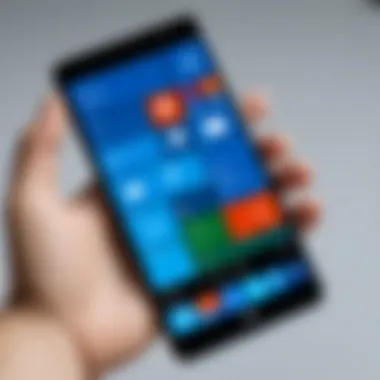Exploring Windows 11 Mobile: A Comprehensive Overview


Intro
Windows 11 Mobile represents a significant step in the evolution of mobile operating systems. This article aims to present a thorough examination of the platform, covering various dimensions such as features, user experience, and performance. As this new OS enters a competitive market, it becomes essential to analyze its implications not only for end-users but also for the tech industry as a whole.
In an era where smartphones integrate deeply into daily life, understanding Windows 11 Mobile’s capabilities can provide valuable insights for both technologists and casual users. We will explore the product's specifications and functionality while addressing its potential impact on the mobile landscape.
Product Overview
Windows 11 Mobile is designed to merge the functionalities of a desktop OS with the portability of mobile devices. Launched as an upgrade to its predecessors, this platform features several key attributes.
- Unified Interface: The user interface of Windows 11 Mobile has been designed to be intuitive. It features a streamlined design that facilitates easy navigation.
- Multi-Device Functionality: One of the standout features is its ability to synchronize seamlessly across multiple devices, like tablets and PCs. Users can start tasks on their mobile and continue them on other devices.
- Enhanced Security: Windows 11 Mobile incorporates advanced security measures, making it suitable for both personal and professional use.
- App Compatibility: The platform supports a wide range of applications, ensuring users can access essential tools and services from various categories.
The specifications include:
- Processor: Qualcomm Snapdragon 888
- Display: 6.7 inches AMOLED
- RAM: 8 GB
- Storage: Options from 128 GB to 512 GB
Performance and User Experience
Understanding performance is paramount for evaluating any mobile operating system. Windows 11 Mobile tends to excel in several areas after thorough hands-on testing.
Hands-on Testing
During initial testing, the operating system showcased fast boot times and smooth multitasking abilities. The experience remains fluid even while running several applications simultaneously.
User Interface
The user interface prioritizes usability. With a clean aesthetic and well-organized menus, users can navigate with minimal effort. Features such as customizable widgets and dark mode contribute to a pleasant user experience.
Comparison with Similar Products
When compared to platforms like Android and iOS, Windows 11 Mobile holds its ground but faces significant competition. Users may find that specific apps on Android perform better. However, Windows 11 Mobile’s integration with Windows PC offers a unique advantage.
Design and Build Quality
Moving to the physical aspect, the design and build quality of devices running Windows 11 Mobile reflect a commitment to aesthetics and functionality.
- Design Elements: The product showcases clean lines and modernity that appeals to many users.
- Materials and Durability: Constructed with sturdy materials, this OS is designed to withstand daily use while maintaining a premium feel. Feedback on various forums indicates a strong preference for the texture and grip of devices that utilize Windows 11 Mobile.
- Ergonomics: The layout promotes comfortable usage, reducing strain during extended use.
Technology and Innovation
Exploring innovative features, Windows 11 Mobile brings several technologies to users.
Groundbreaking Elements
One notable feature is the virtual desktop experience, allowing users to switch between different workspaces for various tasks. The touch optimization is also commendable, offering smooth interaction.
Potential Impact
This operating system may influence future designs across the consumer tech industry, promoting more integration between mobile and desktop environments.
Future Developments


Emerging trends show a focus on AI enhancements and 5G integration. This positioning can yield benefits for productivity and connectivity.
Pricing and Value Proposition
Pricing strategies play a crucial role in consumer choices. Windows 11 Mobile aims to offer significant value for the price.
- Affordability: Offers various pricing tiers, making it accessible for a broader audience.
- Value Comparison: When looking at competing products, many users find Windows 11 Mobile’s capabilities align closely with higher-priced devices.
- Recommendations: For those who value integration with Windows PC and prioritize security, this platform stands as a recommended choice.
Preface to Windows Mobile
The introduction of Windows 11 Mobile marks a significant moment in the evolution of mobile operating systems. It becomes essential to understand the key elements that define this platform, its features, and the implications for users today. With the increasing reliance on mobile devices for both personal and professional use, the landscape of mobile operating systems is more competitive than ever.
Notably, Windows 11 Mobile builds upon the legacy of its predecessors, offering enhanced functionalities that aim to provide a seamless user experience.
History of Windows Mobile Operating Systems
Windows Mobile has undergone various transformations since its inception. The original Windows Mobile was launched in the early 2000s, designed primarily for pocket PCs and smartphones. Those versions focused on productivity, allowing users to manage emails and documents on the go. As technology advanced, Microsoft attempted to reshape its offerings through Windows Phone 7 in 2010 and later, Windows 10 Mobile.
Windows Phone 7 introduced a new tile-based user interface, which was a departure from traditional designs and aimed to make navigation intuitive. However, despite these efforts, it struggled to capture significant market share against rivals like iOS and Android. Eventually, with Windows 10 Mobile, Microsoft aimed to unify its operating systems across devices. However, lack of app support and commitment weakened its position.
Transition from Windows Mobile to Windows
The transition from Windows 10 Mobile to Windows 11 is marked by several key considerations. First, Microsoft acknowledged the need for a fresh start, addressing issues that have plagued previous versions. The company focused heavily on user interface enhancements, aiming for a more polished and modern aesthetic.
In this new version, one pivotal aspect is the alignment with the broader Windows 11 desktop experience. The familiar interface aims to provide continuity for users transitioning from a PC to their mobile devices, potentially making it easier for users to navigate between different environments.
Moreover, significant performance improvements were announced, from faster load times to optimized memory use. These advancements indicate a clear intent to compete more effectively in the evolving mobile market. The emphasis on security enhancements also illustrates a broader understanding of user needs. As mobile devices become integral to everyday life, ensuring safety in data management remains a priority.
Windows 11 Mobile aims to overcome the limitations faced by its predecessors by emphasizing integration, performance, and user-centric design. Understanding this foundation provides insights into its potential impact on users and the mobile operating system market as a whole.
Key Features of Windows Mobile
The discussion on the key features of Windows 11 Mobile is significant because it lays the groundwork for understanding the overall user experience and functionality of this operating system. Each feature interconnects, enhancing the overall performance and usability, crucial for tech-savvy users and enthusiasts. Evaluating these features provides insights into how Windows 11 Mobile aims to compete in a saturated mobile OS market.
User Interface and Design Principles
The user interface of Windows 11 Mobile is designed with a focus on simplicity and efficiency. The primary goal is to create a seamless experience for users, promoting easy navigation and accessibility. Windows 11 Mobile adopts a clean layout that prioritizes essential functions while keeping aesthetics in mind.
One notable aspect is the new Start Menu, which centers application icons, making it easier for users to access frequently used apps. This design change follows contemporary trends in mobile interfaces, yet it retains some of the familiar elements inherent to Windows design. This balance can make it approachable for those transitioning from previous versions of Windows Mobile.
The interaction principles have also been simplified. For example, gestures, such as swiping and tapping, are utilized effectively to control the operating system without overwhelming the user with options. Moreover, color themes and visual prompts further amplify user experience, allowing for personalized adjustments to fit individual preferences. Users who value aesthetics will appreciate the attention to detail in both the appearance and functionality of the interface.
Performance Enhancements
Performance is a critical area where Windows 11 Mobile aims to excel. The operating system incorporates optimization strategies that cater to both high-end and more modest devices. This flexibility ensures that users can enjoy smooth performance regardless of their hardware specifications.
One standout feature is the integration of adaptive performance management. This system intelligently adjusts resources based on user behavior and app usage, ensuring that devices run efficiently without unnecessary battery drain. For example, the system may decrease resource allocation for background apps when foreground apps demand higher performance. This aspect is particularly appealing to users who prioritize battery life and responsiveness in their mobile experience.
Furthermore, Windows 11 Mobile is built on a more refined kernel compared to its predecessor. This improvement allows for faster load times and decreased app crashes, creating a more dependable environment for users. The emphasis on multitasking is evident, as users can run multiple applications with minimal lag, a feature especially treasured by productivity enthusiasts.
Security Features and Updates
In today's digital landscape, security is paramount. Windows 11 Mobile prioritizes user protection through a suite of robust security features. Noteworthy enhancements include biometric authentication and improved encryption protocols that safeguard user data. The operating system supports Windows Hello, which allows users to log in with facial recognition or fingerprints, offering both convenience and security.


Regular updates are an essential component of maintaining security integrity. Microsoft has committed to providing timely updates that address vulnerabilities and offer new features. This proactive approach reassures users that their devices will consistently benefit from the latest security advancements and bug fixes.
Moreover, Windows 11 Mobile emphasizes secure application environments. This reduces risks associated with third-party apps by implementing rigorous security checks during application installations. Users can feel more confident knowing their devices are less susceptible to malware or phishing attacks. This commitment to security reinforces user trust in the platform, a crucial factor for adoption in a competitive mobile market.
"In the evolving world of technology, robust security features are not optional but necessary to protect user data and maintain trust."
Device Compatibility and Ecosystem
The device compatibility and ecosystem of Windows 11 Mobile is critical in understanding its role within the broader mobile operating system landscape. This section evaluates the core elements that define compatibility, assessing the associated benefits and potential limitations that may influence user decisions.
Supported Devices
Windows 11 Mobile offers a tailored experience across a select range of devices. Primarily, it is optimized for flagship smartphones that meet specific hardware requirements. Devices such as the Microsoft Surface Duo and select models from third-party manufacturers demonstrate the capabilities of this operating system.
These supported devices feature advanced specifications, including minimum RAM and processor capacity. This ensures smooth performance and enhances user satisfaction. The limited selection may, however, restrict broader adoption. Users on older or unsupported devices may find themselves unable to transition to this new platform. For instance, devices that previously ran Windows 10 Mobile must be upgraded to access Windows 11 Mobile.
Integration with Windows and Other Microsoft Services
One of the strengths of Windows 11 Mobile is its seamless integration with other Microsoft products. Users experience a cohesive environment when transitioning from desktop to mobile. Services such as Microsoft 365, OneDrive, and Teams enhance productivity by allowing users to share and synchronize content effortlessly.
This integration enhances the app ecosystem by fostering a fluid exchange of data across platforms. For instance, a user can start a document on their Windows laptop and finish it on their mobile device without any disruptions. Such a unified approach not only encourages user engagement but also reinforces Microsoft’s position in the productivity software space.
App Availability and Store Options
The availability of apps is a decisive factor in the attractiveness of any mobile platform. Windows 11 Mobile features the Microsoft Store, providing access to a variety of applications tailored to users' needs. However, the range of apps may not match those available on Android or iOS. While popular applications are often present, newer and niche offerings may be limited.
Users can find apps across different categories, including productivity, entertainment, and social media. Nevertheless, developers are encouraged to create more Windows 11 Mobile-specific applications to enrich the ecosystem. Addressing this gap is crucial for Microsoft if it wishes to encourage switching from more established platforms.
Overall, the device compatibility and ecosystem aspects of Windows 11 Mobile play a significant role in shaping the users’ experiences. As Microsoft continues to refine its offerings, the integration with existing services and the expansion of app availability will determine the operating system's long-term viability in the market.
User Experience and Feedback
User experience is critical in determining the success of any operating system, and Windows 11 Mobile is no exception. The user experience encompasses all aspects, from the intuitiveness of the user interface to how well the mobile device manages resources like battery life. Positive user feedback can signal to potential users that the platform is robust and worth considering, while negative experiences can hinder adoption.
User Interface Usability
The usability of an interface is foundational in retaining user interest and ensuring satisfaction. Windows 11 Mobile claims to prioritize a simplified user interface that not only appeals visually but also enhances navigation. Key features, such as larger icons and a customizable start menu, seek to bridge the gap between functionality and aesthetic appeal. This design consideration ensures that users with varying levels of tech-savviness can navigate effortlessly. Moreover, Windows has taken steps to make gestures and touch inputs more responsive, contributing to what many users find a seamless experience.
Battery Life and Resource Management
Battery performance and resource management directly affect user experience. Windows 11 Mobile aims to optimize battery usage through intelligent resource management strategies. Developers included features such as battery saver modes, background activity limitations, and better app optimization that work together to extend battery life. This approach allows users to go longer between charges, thus increasing their overall satisfaction with the device. Moreover, efficient resource management translates into smoother operation, reducing lag and improving application performance, which is something users genuinely appreciate.
Consumer Satisfaction and Reviews
Consumer reviews provide valuable insights into how Windows 11 Mobile is being received in the market. Early reviews have highlighted areas such as interface ease-of-use and device performance. However, they also indicate areas where users feel improvements are necessary. The gathering of user feedback through social platforms like Reddit serves as a barometer for Microsoft to gauge public sentiment. Some users appreciate the harmonious integration of Microsoft services within the OS, marking a significant advantage over competitors. Yet, others express concerns regarding app availability, suggesting that a more extensive library could enhance user satisfaction. Through continual updates and listening to user feedback, Microsoft has the opportunity to refine Windows 11 Mobile and better serve its users.
Comparative Analysis
In any discussion about mobile operating systems, it is vital to conduct a comparative analysis. This analysis serves to evaluate Windows 11 Mobile against its main competitors, namely Android and iOS. By understanding the strengths and weaknesses of each platform, users can make informed choices that suit their individual needs.
This comparison focuses on specific elements such as usability, performance, feature set, and overall ecosystem integration. The benefits include not only identifying the unique selling points of Windows 11 Mobile but also revealing areas where improvements might be necessary. By scrutinizing these operating systems side by side, both users and developers can grasp the competitive landscape and the challenges Windows 11 Mobile faces in gaining market traction.


Windows Mobile vs. Android
When comparing Windows 11 Mobile with Android, one must consider the sheer diversity of the Android ecosystem. Android boasts a wide range of devices and manufacturers, leading to varied user experiences. Most users appreciate the customizability of Android, allowing for a tailored experience that can fit almost any preference or need.
On the flip side, Windows 11 Mobile offers a more streamlined experience across fewer devices. This can lead to better optimization in terms of performance and security. However, it lacks the extensive library of applications that Android users enjoy. Most popular apps are available on both platforms, but the number of exclusive Android apps remains a significant advantage.
Windows Mobile vs. iOS
In contrast to Apple's iOS, Windows 11 Mobile faces its own obstacles. iOS is known for its robust security and seamless integration with Apple's ecosystem. Users benefit from a highly refined user interface and a consistent experience across devices. Software updates roll out simultaneously to all iOS devices, ensuring users always have access to the latest features, security patches, and improvements.
Windows 11 Mobile, while showcasing certain innovative features, does not yet match the performance and ecosystem benefits of iOS. The development of apps in the Windows store has also slowed down compared to iOS, leading to a more limited user experience. This reality has led many to question whether Windows 11 Mobile can establish a foothold in the iOS-dominated market.
Market Position and Competition
The current market position of Windows 11 Mobile is precarious. As a latecomer to the mobile OS scene, it competes against two behemoths—Android and iOS. Analysis indicates that despite its unique features, Windows 11 Mobile struggles to attract a broader user base. Several factors contribute to this dynamic:
- Brand Recognition: Android and iOS have entrenched themselves in the market, with established brand loyalty.
- Developer Support: Many developers prioritize creating applications for major platforms like Android and iOS, leaving Windows 11 Mobile with fewer options.
- Consumer Expectations: Users have set standards based on their experiences with leading mobile operating systems, and Windows 11 Mobile must meet or exceed these expectations.
Future Developments and Updates
The rapid evolution of technology necessitates continuous improvement and innovation within any mobile platform, making Future Developments and Updates significant in understanding Windows 11 Mobile's trajectory. As Microsoft aims to differentiate its product, ongoing updates may introduce needed features that enhance user experiences—fostering retention and attracting new users. This segment investigates what users might expect, along with the strategic vision Microsoft holds for its mobile operating system.
Expected Features in Future Releases
Looking ahead, several anticipated features for Windows 11 Mobile could redefine its standing in the competitive landscape. Potential updates may include enhancements to multitasking capabilities, aiming to offer a seamless transition between apps. Improved battery optimization techniques can bolster the longevity of devices significantly, addressing a common concern among current users.
Several specific features might be on the horizon:
- Enhanced integration with Windows 11 for better synchronization across devices.
- Increased support for third-party applications, particularly from popular developers to fill gaps in available apps.
- Refined user interface adjustments, focusing on user-friendliness while appealing to diverse user demographics.
Such developments can significantly elevate Windows 11 Mobile's functionality and user satisfaction, emphasizing the platform's commitment to evolve.
Microsoft’s Vision for Mobile
Microsoft envisions a future where Windows 11 Mobile not only coexists but flourishes alongside its desktop counterpart and other devices within the Microsoft ecosystem. This vision entails creating a cohesive user experience across all platforms, making it easier for users to switch between devices without disruptions.
The following elements are central to Microsoft’s strategy:
- Focus on accessibility to ensure a wide range of users can engage with the platform effectively.
- Regular updates to security features, making devices inherently safer against threats, thus gaining user trust.
- Collaborative partnerships with developers to enrich the app landscape, increasing the utility of Windows 11 Mobile.
This strategic outlook highlights a commitment not just to existing users but to the broader mobile community, indicating that Microsoft is prepared to invest heavily in the future of its mobile operating system.
"By fostering a vibrant ecosystem and maintaining an emphasis on user-centric development, Windows 11 Mobile aims to meet and exceed user expectations."
In summary, the Future Developments and Updates section positions Windows 11 Mobile as a platform dedicated to its growth potential and responsiveness to user needs, which can ultimately help solidify its place within the ever-changing digital landscape.
End
The conclusion of this article serves a vital role in synthesizing insights regarding Windows 11 Mobile. Here, we summarize key discussions while also addressing the future landscape of mobile operating systems. Users and tech enthusiasts require an understanding of the environment in which Windows 11 Mobile operates. This summary highlights the relevance of previous sections, linking features, performance, and user experience back to overall expectations.
Evaluating Windows Mobile's Potential
When evaluating the potential of Windows 11 Mobile, several factors come into play. One must consider its feature set that aims to offer a fresh experience. These features are not just enhancements; they are crafted to address current market demands. Users are increasingly looking for seamless integration across devices, and this OS promises to deliver that.
The transition from Windows 10 Mobile is notable. It is essential to discuss the user base's reception towards this new system. Feedback indicates a desire for efficiency paired with innovative design. Windows 11 Mobile seems to focus on these areas, aiming to bridge any gaps that users experienced in previous versions. This might be crucial as Microsoft seeks to reclaim market share against robust competitors like Android and iOS.
Moreover, the insights gathered from consumer reviews suggest that many users are cautiously optimistic. They await updates that will enhance functionalities and user interactions. Microsoft’s dedication to security also forms a pivotal aspect of user confidence, as seen in remarks regarding its security features and regular updates.
In essence, the evaluation of Windows 11 Mobile holds promise if Microsoft continues to engage with its user base and integrates necessary improvements. The landscape of mobile operating systems is ever-evolving. Windows 11 Mobile may find its niche, provided it remains adaptable to user feedback and technological advancements. As the mobile OS market continues to grow, understanding these developments will help users and developers alike in making informed decisions as they navigate the complexities of modern mobile technology.



